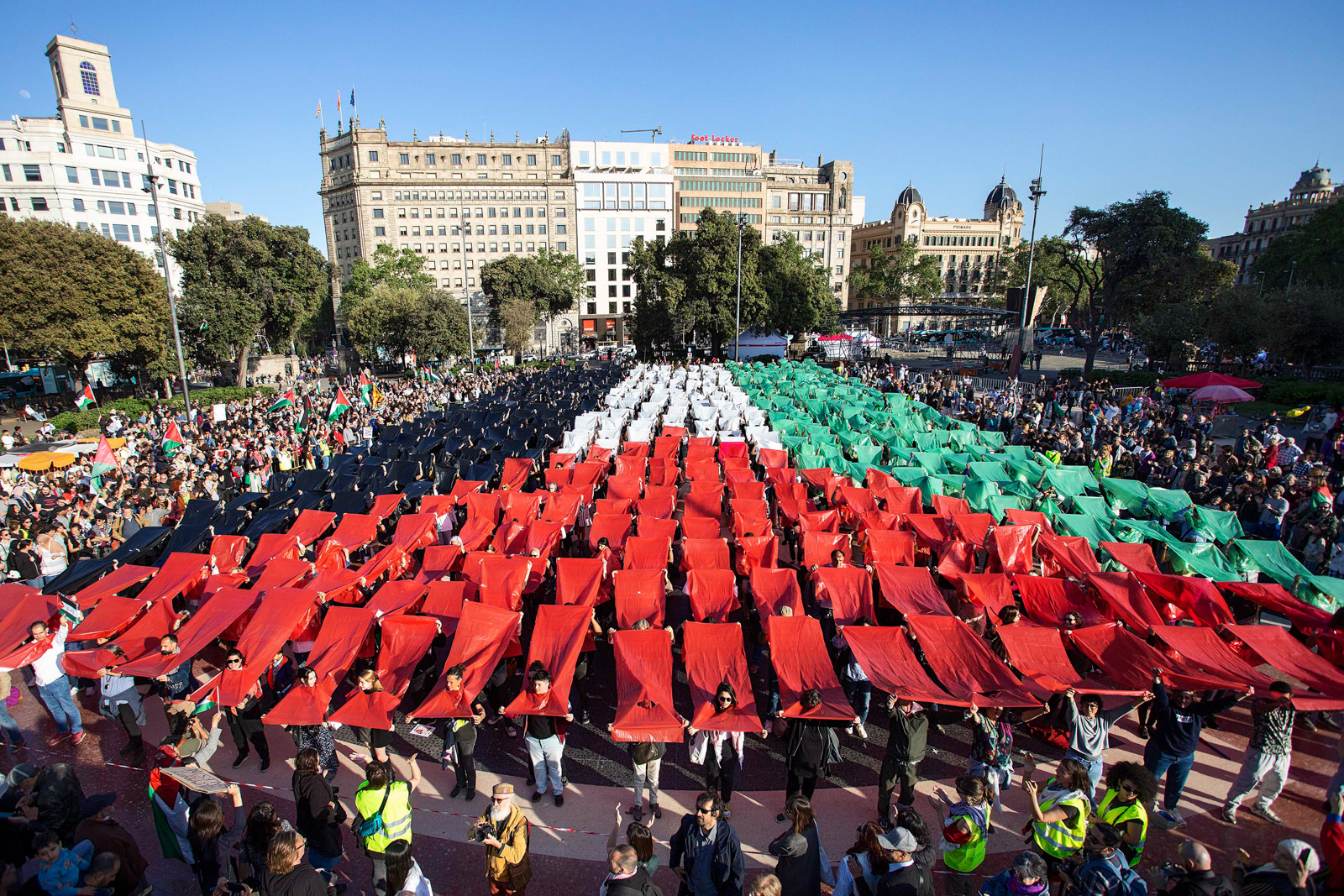Spain, Ireland and Norway have recognised the state of Palestine. What will this change?
Activists and academics welcome Spain’s support of a two-state solution but question whether it’s too little, too late
–

For months, Spain has worked to get more European countries to recognise the state of Palestine in an effort to support a two-state solution to the conflict with Israel.
This diplomatic campaign came to fruition on 22 May when Spain, Ireland and Norway announced they would officially recognise Palestinian statehood from 28 May 2024. Pedro Sánchez, Spain’s socialist prime minister, received warm applause when he made the announcement to the country’s parliament.
Israel responded by saying it would recall its ambassadors to Spain, Ireland and Norway for “consulations”. Foreign minister Israel Katz also said the ambassadors for all three countries in Israel would be summoned for “reprimand talks”.
“Israel will not go over this in silence – there will be other serious consequences,” he added.
Sánchez recently tweeted that “the realisation of the two-state solution is the only way to achieve lasting peace and security in the region”. He has argued, however, that Spain cannot make this step alone and more Western countries need to share the responsibility if it’s going to have an impact. To date, 140 countries — most in Africa, Asia and Latin America — recognise the state of Palestine, while only eight of the 27 EU member states do — Poland, Bulgaria, Romania, Hungary, Czechia, Slovakia, Sweden and Cyprus.
Nearly eight months into Israel’s war in Gaza following the attack launched by Hamas militants on October 7, in which some 1,200 Israelis were killed and 250 taken hostage, more than 34,000 Palestinians have been killed and 80% of Gaza’s 2.3 million population displaced.
Palestinian activists in Spain have welcomed the move but feel it still falls short of addressing the complex crises faced by Palestinians. “We would obviously love to have a Palestinian state, but what two states?” said Natalia Abu Sharar, president of the Palestinian Community of Catalonia.
The two-state solution was proposed during the 1993 Oslo Accords — a pair of interim agreements between Israel and the Palestine Liberation Organisation. Since then, thousands of illegal Israeli settlements have been built on the West Bank, dividing Palestinian territory into scattered, small dots surrounded by colonialist settlements, Abu Sharar explained. “We Palestinians want to be a state, we want to live without occupation, we want to know what it’s like to live in peace, but we know that if there’s no justice, there’s never going to be a Palestinian state.”
Sharar believes that justice and respect for Palestinians’ human rights need to come first. The immediate priority, she argues, must be to agree on a ceasefire and to get aid to the 3.1 million Palestinians in need of humanitarian assistance.
Recognition of Palestine statehood would, however, have significant practical and diplomatic implications, explains Elisenda Calvet Martínez, an associate professor of international law at the University of Barcelona. “The recognition goes beyond just nice words. Recognising Palestinians means they can travel [to] and establish international relations and bilateral agreements with other countries,” she said. “We must work to make sure Palestine can truly be a state with all the legal guarantees.”
Calvet believes this must include Palestine becoming a full member of the United Nations, a request that has been continuously vetoed by the United States, and Israel’s agreement to cease its occupation of Palestinian territory and expanding its settlements in the West Bank, and to relinquish its control over Gaza’s borders. “It’s going to be impossible for Palestine to exist as a state if it doesn’t actually have control of its territory,” she said.
In 2014, Margot Wallström, the Swedish foreign minister, led a similar push to recognise Palestine; no other European countries supported the initiative and it caused lasting damage to Sweden’s diplomatic relations with Israel. “I don’t think much came out of it, until maybe now,” said Isabell Schierenbeck, a professor in political science at the University of Gothenburg. “Maybe [the fact] that Sweden did it makes it easier for other states to follow. But for a very long time, nobody really thought that it made any difference.”. Now, with growing international concern over Israel’s war in Gaza, the landscape has changed. As other countries follow Spain’s lead, it will be difficult for Israel to cut diplomatic ties with all of them, Schierenbeck explained.
Even if the move does generate strong international pressure on Israel to agree a two-state solution, Schierenbeck cautions that putting the agreement into action would be extremely challenging. The fact that the coalition government of Benjamin Netanyahu, the Israeli prime minister, is sustained by the support of the far right, ultra-nationalist Religious Zionism block, for example. “It’s almost impossible for [Netanyahu] to raise that question.”
For some Palestinian activists in Spain, the window for a two-state solution has already closed. Salah Jamal, an activist and author who left Palestine in 1967 before settling in Barcelona, believes a two-state solution is impossible. “Western governments fill their mouths with talk of two states. It has become a slogan,” he said. “Everyone talks about two states, but no one does anything to execute the idea.”
To Jamal, the only viable solution is to change a world order that allows the US and four other permanent members of the UN power of veto. “Only then will the privilege that the state of Israel has, the protection it has from the elite, go away,” he said. “Then there will be the possibility of reconciliation between Palestinians and Israelis to form one sole state with equal rights for all.”
This story, originally published on Monday 20 May, was revised and updated on Wednesday 22 May following the announcement by Spain, Ireland and Norway.
Topics
Get the Hyphen weekly
Subscribe to Hyphen’s weekly round-up for insightful reportage, commentary and the latest arts and lifestyle coverage, from across the UK and Europe
